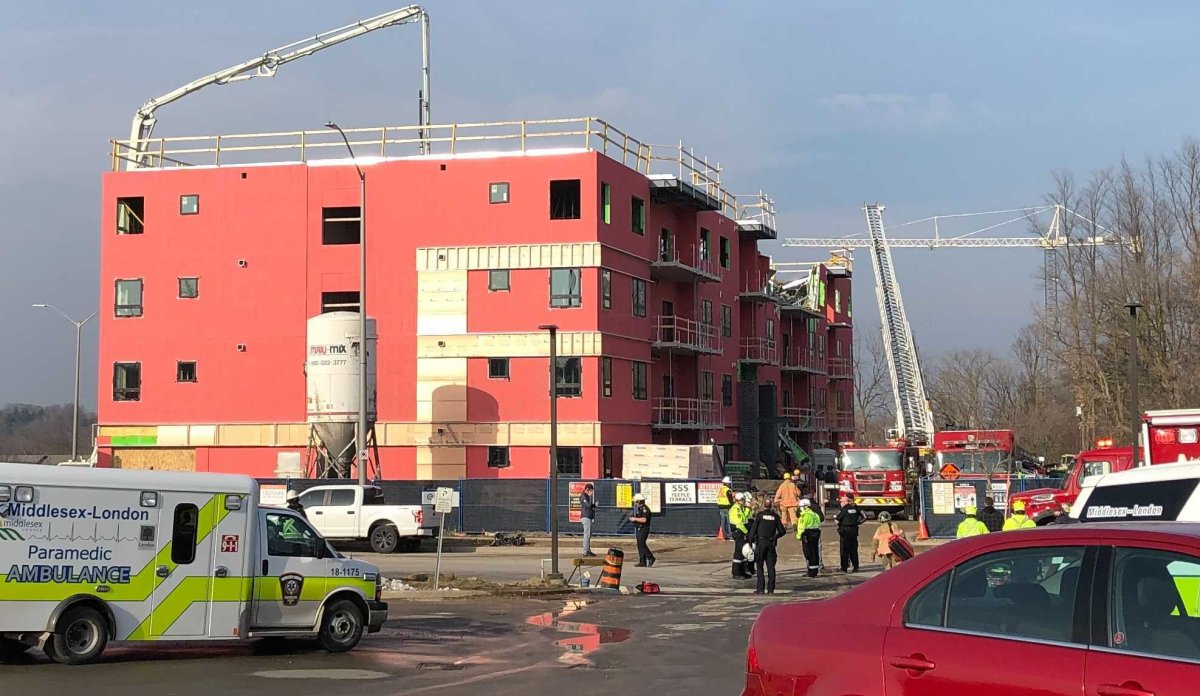Three-and-a-half years after a fatal partial building collapse shook a southwestern Ontario community, the firefighters who played a pivotal role in minimizing the carnage have been honoured for their bravery.

On Dec. 11, 2020, a section of a building that was under construction, located at 555 Teeple Terrace in London, Ont., collapsed to the ground during a concrete pour, trapping several workers underneath.
Two men – John Martens, 21, of Langton, and Henry Harder, 26, of Tillsonburg – were killed in the collapse. Four other construction workers were injured. Earlier this year, the Ministry of Labour levelled a combined $400,000 in fines against two regional construction companies in connection with the collapse.
Now, two of the firefighters at the scene are providing an inside look at how crews worked together to help rescue construction workers trapped in wet cement, tons of debris and twisted metal while one of those rescued is again thanking first responders while advocating for change.
'Never seen anything like it'
It was a crisp, sunny morning, just before noon, when London Fire Department Capt. Derrick Martin said a call came in for a building collapse.
“On the way it was confirmed by (the London Police Service) that there were construction (workers) trapped inside,” Martin said.
“I was the captain on Engine 4 that day … and we maybe hit the gas pedal a little bit harder to get there even quicker as we could, than normal.”
Martin said his team grabbed tools and went inside. They were concerned about the structural integrity of a “wall” that was made up of floors stacked on top of each other vertically inside what they nicknamed “the pit” where the construction workers were trapped.
“(We) went into the pit and began digging in and extricating the construction workers, the patients, from the pit. Wet cement, tons of debris and metal. It was about as extreme as you could think of.… I’d never seen anything like it in my career.”
One of those construction workers trapped in the debris was Jake Hurl, who was on the ground floor of the four-storey building with his legs trapped under three floors of rubble. It took over four hours to free him and, at one point, amputation of his legs was considered.
“They ran in there like, it was almost like they didn’t even think that death could have came to them at one point, you know? … There was no pause, it was just, ‘All right, we got this call. We’re headed to this call, we get out of the truck and we run in there and try to save as many lives as we can.’”
Martin said his crew remained at the scene until there was nothing more they could assist with, for nearly five hours.
“We were basically there just minutes after the first arriving crew from LFD and LPS, and we stayed until the job was done, up until as much as we could get done at that point.”
Firefighter Adam Froats was in one of the later arriving units, so he already had some idea of what “we were getting into.”
“When I’d arrived, there were a number of people in there vigorously shovelling and trying to see if we had patients,” he said.
“But it’s really hard to explain just what that was when we walked into that building. There was a lot of fear, a lot of confusion, a lot of noise.”
'We're going to get the job done'
For first responders, however, Froats said the fear doesn’t register in the moment.
“We’ve got a job in front of us, and we just get to work.”
But how do you “get to work” at such a chaotic scene? Both Froats and Martin said hands-on training is nearly impossible.
“A lot of it, unfortunately, was bookwork. So we were prepared and reviewing, I guess, ‘voids’ that we might … be faced with where patients might be,” Martin said.
“We had the tools, but basically that call came down to manpower and teamwork, working alongside with London Police Services.”
Froats said much of what firefighters do is “problem-solving” but that even when simulation is possible, changing a single piece can alter the entire puzzle.
“We kind of lean on our leaders, our captains and our chiefs to make decisions. And myself, as a front-line firefighter, just kind of do what we need to do, whether that’s shovelling or carrying or digging – whatever’s asked.”
Teamwork and trust are paramount, Martin explained.
“It was one of the most incredible sights I’ve ever seen in my life. Everybody working together for a common goal. There were highs and lows and, overall, a successful day all things considered, with what London Police Service and LFD had to deal with that day.”
Hurl said it’s amazing that emergency personnel were able to save as many lives as they did.
“And actually, all the ones that survived have recovered somewhat well and are living a somewhat normal life now.”
Hurl spent 28 days in hospital and has been continuing his physical recovery years later, now back in the gym and walking with “a little bit of a limp, but it’s probably not all that noticeable.” He also continues to attend therapy but has recently moved from weekly sessions to sessions every other week.
“I’m still going to remember that day no matter what, but it’s really just finding coping mechanisms, which I have found now” through music, work and helping others.
He is starting a consulting business and has been working with one of the police officers who helped rescue him. The former officer runs Forest City Demolition, which began as a side project and predates the Teeple Terrace collapse. Hurl also regularly meets with one of the fire captains at the scene that day for lunch.
'Such an honour'
On Monday, three members of the London Police Service and 35 members of the London Fire Department were awarded either the Ontario Medal for Police Bravery or the Ontario Medal for Firefighter Bravery for 2023. The province noted that four members of the London Fire Department were honoured for their efforts the year prior.
“Despite the risk, (LPS) Sergeant John Dance and Constables Blair Corsaut and Brent Thomas courageously entered the building to help. Aggressive rescue and medical operations began, with primary responders focused on freeing the survivors and helping the walking wounded. With unwavering courage, 39 firefighters toiled tirelessly, navigating treacherous conditions, while repeatedly putting themselves in harm’s way to save lives,” the province wrote in announcing the award.
The City of London first responders were the largest group to be awarded on Monday and both Martin and Froats described it as “an honour.”
“It will be something I’ll remember forever,” Martin added. “And I was honoured to be there with some great people. There were amazing stories of first responders all across Ontario.”
Hurl said first responders showcased more than bravery on that day.
“Brave is almost an understatement in some way,” he said. “It’s a truly incredible story, in my opinion.… To me, it’s a wild mindset to have that you’re willing to sacrifice your life for someone that you don’t know.”
While Hurl had nothing but kind words for the emergency personnel who gave him his “second chance at life,” he is still advocating for systemic change to prevent collapses like this from happening again.
Hurl said he would like to see rule changes, including barring wet concrete from being poured above people’s heads and stiffer penalties for negligence. He said the ministry seems uninterested in sitting down with him, but he will continue to speak out when he can.
In a statement, the Ministry of Labour said it takes enforcement of the Occupational Health and Safety Act “very seriously” and that Ontario has “one of the best safety records in Canada.” The spokesperson added that the province is working to increase the maximum fines “for corporations, officers and directors of corporations that fail to provide a safe work environment.”
“That is why Ontario currently has the highest fines in the country for businesses that are found to have violated worker health and safety,” the statement continued.
“The Ministry continues to look for different ways to improve the health and safety of Ontario workers and ensure the compliance and enforcement of OHSA. Anyone can report health and safety concerns by contacting the ministry.”
A $2-million lawsuit filed in late 2021 by Hurl’s parents and the wife of one of the other injured workers remains active. Defendants include the Ministry of Labour, as well as the City of London and the developers.
— with files from Global News’ Ben Harrietha and Sawyer Bogdan







Comments